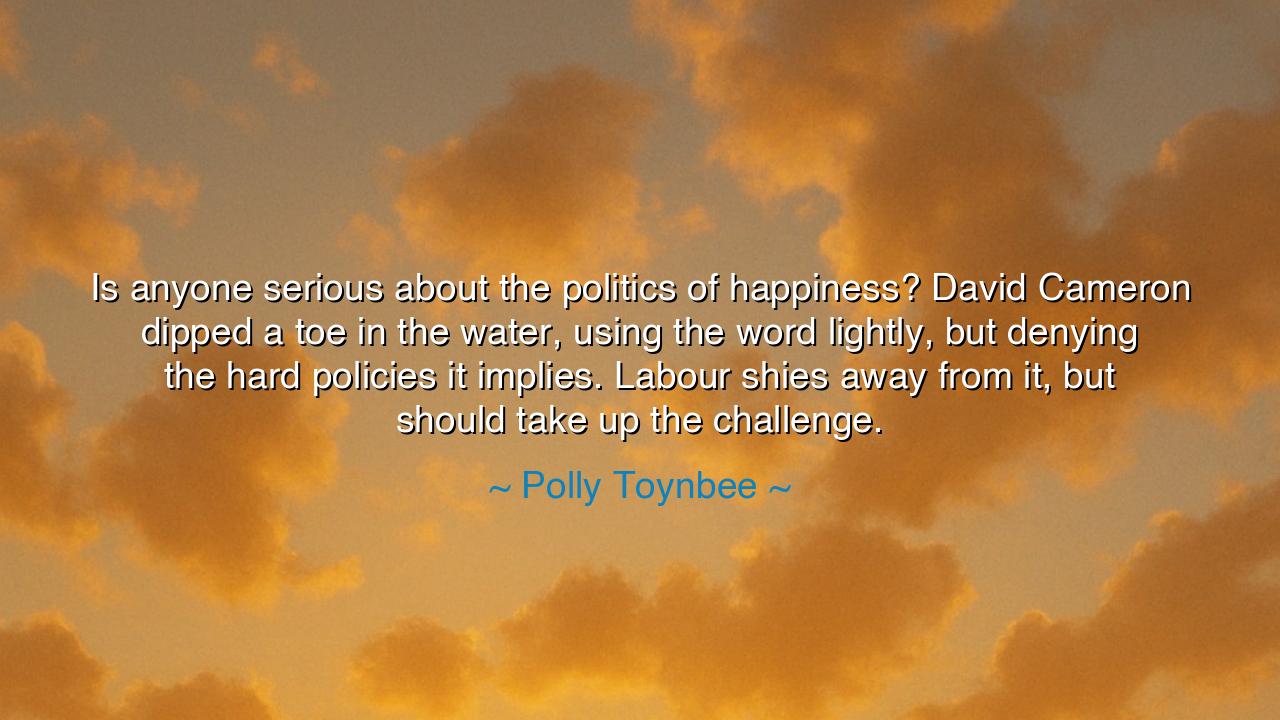
Is anyone serious about the politics of happiness? David Cameron
Is anyone serious about the politics of happiness? David Cameron dipped a toe in the water, using the word lightly, but denying the hard policies it implies. Labour shies away from it, but should take up the challenge.






“Is anyone serious about the politics of happiness? David Cameron dipped a toe in the water, using the word lightly, but denying the hard policies it implies. Labour shies away from it, but should take up the challenge.” Thus wrote Polly Toynbee, the English journalist and moral voice of social justice, raising her challenge not to the hearts of individuals, but to the conscience of nations. Beneath her sharp and worldly observation lies a truth as ancient as civilization itself: that the measure of a society is not its wealth, nor its power, but the happiness of its people. Yet happiness, she reminds us, is not a mere sentiment to be whispered in speeches or pinned to slogans — it is a matter of justice, of policy, of courage.
From the dawn of states, rulers have spoken of prosperity, of order, of empire — but few have spoken truly of happiness. In ancient Athens, the philosopher Aristotle declared that the aim of all politics was eudaimonia, the flourishing of human life. He taught that a city is not rich when its treasuries are full, but when its citizens live in virtue, health, and dignity. Yet, as Toynbee laments, even in our enlightened age, the politics of happiness is treated as folly — a soft word in a hard world. Leaders speak of growth, security, and competition, but hesitate to speak of joy, meaning, and the well-being of the soul. They fear that to take happiness seriously would demand a revolution not of rhetoric, but of responsibility.
When David Cameron, then Prime Minister of Britain, invoked “happiness” as a measure of progress, he spoke a noble word — but, as Toynbee observed, he only dipped a toe. For he offered the poetry of the idea without the burden of its practice. True politics of happiness demands more than surveys and slogans; it demands policies that heal the wounds of inequality, that ensure not only the survival of the poor but the dignity of all. To pursue happiness through governance is to challenge the very structures of power, to ask not how much wealth the nation produces, but how much peace its people feel when they rest.
History offers us glimpses of those rare leaders who took this challenge to heart. In ancient India, the emperor Ashoka turned from conquest to compassion after the horrors of war. Renouncing the sword, he carved upon his pillars the promise of a new order: one grounded in kindness, health, justice, and spiritual well-being. He declared that the greatness of a ruler lies not in how many lands he subdues, but in how many hearts he uplifts. His vision, like Toynbee’s plea, was a reminder that the happiness of a people is not a dream beyond politics, but the highest purpose of it.
The tragedy of the modern age is that we have made happiness a private matter, divorced from the public realm. We treat it as a personal indulgence rather than a collective duty. But no man is happy alone in a suffering world. When children grow hungry, when workers toil without rest, when the aged live in fear, the wealth of the few becomes a burden upon the soul of the whole. Toynbee’s challenge, then, is both political and moral: that nations must dare to make the pursuit of happiness not a phrase, but a policy.
To speak of the politics of happiness is to speak of clean air, fair wages, decent homes, and education that awakens the spirit as well as the mind. It is to demand that governments measure progress not in profits but in peace, not in markets but in meaning. It is to remember that the well-being of the people is not a luxury to be granted after growth, but the very soil from which true prosperity springs. Such politics would be hard, as Toynbee warns — but it would also be holy.
Therefore, my children, when you think of happiness, think not only of your own, but of the happiness that is shared — the kind that binds hearts together and strengthens nations. Demand of your leaders not only that they protect your safety, but that they nurture your joy. And in your own lives, live as citizens of that higher republic — where compassion is law, and peace is policy. For the world will only grow happier when its people believe, as Toynbee believed, that happiness is not an accident of fortune, but a duty of civilization.
Thus let this wisdom endure: Happiness must be governed as well as felt. Let no ruler speak of progress while his people weep, and let no citizen forget that he too is part of the great work — the building of a world where justice and joy walk hand in hand. Only then shall we know the politics of happiness, not as an idle phrase, but as the promise of a better age.






AAdministratorAdministrator
Welcome, honored guests. Please leave a comment, we will respond soon